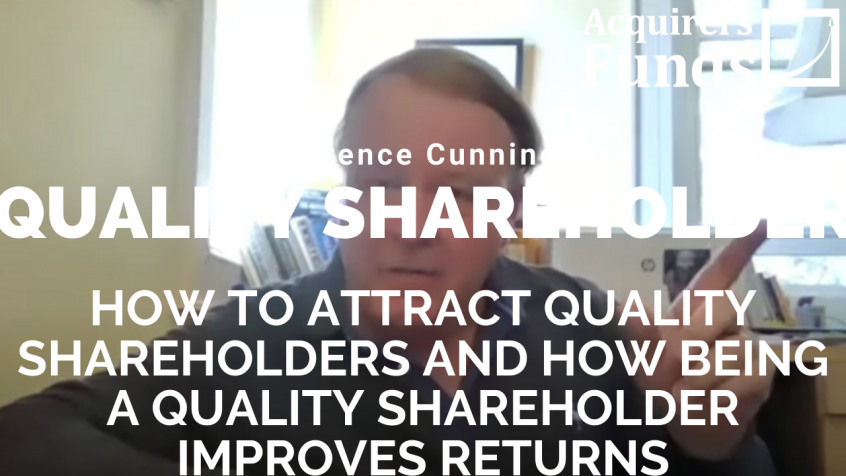In his recent interview with Tobias, Lawrence Cunningham, author of several books including The Essays of Warren Buffett, Dear Shareholder, and Quality Shareholders. discussed A Solution To Proxy Plumbing. Here’s an excerpt from the interview:
Tobias: I think one of the difficulties with Glass Lewis and ESS is that they almost always support incumbent– they always support the management, the incumbent management, and there’s not much of a– I don’t know how much consideration they give of the activist sort of role. I’ve seen many instances where I’ve thought that the activist was probably in the right, and both the ESS and Glass Lewis. It’s a very heavy stamp that they’re able to put on these things. It’s like a third party has– this interested third party who only has your best interest as a shareholder has reviewed this, and they’ve decided that we’re going to support management, but then I don’t know how many– there are many small shareholders out there who rely on that advice, almost exclusively, without realizing that that’s what they always do. Do you have any view on why they behave that way, it’s helpful to get the next job if you’ve supported management?
Lawrence: Well, thanks. It’s a serious problem and that is one of the reasons potentially, we see conflicts of interest among the big indexers and even among those proxy advisors that they’re not sure independent objective observers. They have other relationships with companies or prospective relationships with companies that might be important to them. That may enter into their judgment. Now, they will all respond to that criticism by saying, “We have very thick walls between these different activities within our firm,” and say, “That’s not a problem,” and isolated that.
Another problem is, and I’ll add one statistical observation is that there has been a slight increased propensity of those indexers and the advisors to break with management. You’re right that historically, there has been– if you look at the voting outcomes and large numbers, there’s been a tendency of the passives to support management and the actives to support proponents of shareholders, not just on activist campaigns, but sure, more proposals around emissions or other sorts of things. There has been that divide or that different propensity. It’s starting to change a little bit, and you’re starting to see some indexers say, “Well, no, we’re against this” just ever so slightly, and I take that and partly to be a response to the criticism that you just referenced. It is a small part that I said, they’re trying to increase their budgets to look at the big deals, to look at Dell going private or where this or that merger, and when they sit down and analyze, they say, “Oh, wait a second. We’re not going to go along with this.”
But I’ve got a different idea, I’m thrilled to share it. I put this out in the MarketWatch home just a couple weeks ago too. What I’d like to see is because right now the way I’ve just described it is, the indexers lack a sufficient budget to investigate all the votes and even if they have enough of a budget to get most of the important votes, there’s still a lot of votes where they’re probably not rendering the optimal decision, they certainly lack the optimal information base. On the other hand, the active shareholders, especially my quality shareholders, even the day traders and the ARBs and so on, that the incentive to study and see– especially the ARBs in a merger transaction, buy the stock from the quality shareholders, and then get to vote on the merger. Those people have the incentives to become informed and have the information set. There’s at least a reasonable chance to suppose that the active share cohorts vote is a higher quality vote, let’s say than the indexers.
At least the possibility of this. If that’s true, then what would be nice, if the indexers could become aware of the likely vote of the active cohorts before the indexers have to cast their vote, and indexers could ignore whatever the active investors think. It could be helpful to them to say, “Well, here’s our standard matrix and we’ve had one person look at this, and we think yes, but let’s see what Neuberger Berman, let’s see what Tobias Carlisle is likely to do on this. Let’s look at Fidelity or T. Rowe Price or the other famous, active shareholders who tried to look and study.”
We developed, we patented a product actually, it’s just proxy plumbing, in effect that would enable those active voters to release their intended vote before they have to cast–[crosstalk]
Tobias: That’s a great idea.
Lawrence: Yeah. We just hook it up to there. We don’t even need to be involved in this, all those what we publish it. Here’s what Tobias and we’re not soliciting, we’re not doing anything, so we don’t have to be regulated or anything. The indexers don’t have to– they can ignore it. We don’t really care because we’ve got our matrix or where we made our judgment, and we know what we’re doing. Or they could say, “Well, gosh, that’s really interesting.” So, we’re hoping to create– we’ve got the technology, we think we can do it. If any listeners are interested in just reading a little more, again, you can go– MarketWatch column from perhaps around late early February or January has a little more of the details on that.
Tobias: That’s a really simple, elegant solution to the problem. That’s a great idea. We should implement that 100%.
Lawrence: Thank you very much. Tell everybody.
[laughter]You can find out more about Tobias’ podcast here – The Acquirers Podcast. You can also listen to the podcast on your favorite podcast platforms here:
For all the latest news and podcasts, join our free newsletter here.
Don’t forget to check out our FREE Large Cap 1000 – Stock Screener, here at The Acquirer’s Multiple:




